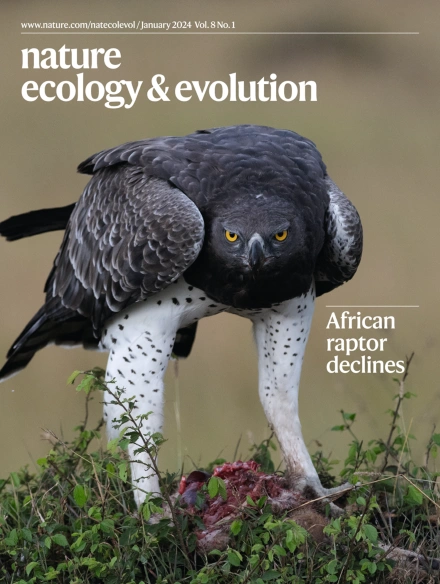Inbreeding depression explains killer whale population dynamics
IF 13.9
1区 生物学
Q1 ECOLOGY
引用次数: 14
Abstract
Understanding the factors that cause endangered populations to either grow or decline is crucial for preserving biodiversity. Conservation efforts often address extrinsic threats, such as environmental degradation and overexploitation, that can limit the recovery of endangered populations. Genetic factors such as inbreeding depression can also affect population dynamics but these effects are rarely measured in the wild and thus often neglected in conservation efforts. Here we show that inbreeding depression strongly influences the population dynamics of an endangered killer whale population, despite genomic signatures of purging of deleterious alleles via natural selection. We find that the ‘Southern Residents’, which are currently endangered despite nearly 50 years of conservation efforts, exhibit strong inbreeding depression for survival. Our population models suggest that this inbreeding depression limits population growth and predict further decline if the population remains genetically isolated and typical environmental conditions continue. The Southern Residents also had more inferred homozygous deleterious alleles than three other, growing, populations, further suggesting that inbreeding depression affects population fitness. These results demonstrate that inbreeding depression can substantially limit the recovery of endangered populations. Conservation actions focused only on extrinsic threats may therefore fail to account for key intrinsic genetic factors that also limit population growth. Genomic and demographic analyses of the ‘Southern Resident’ killer whales in the North Pacific find that strong inbreeding depression is inhibiting growth of this small and isolated population. The findings help to explain why this group of whales is still declining despite 50 years of conservation efforts.

近亲繁殖抑制解释了虎鲸的种群动态
了解导致濒危种群增长或减少的因素对于保护生物多样性至关重要。保护工作通常要解决环境退化和过度开发等外在威胁,这些威胁会限制濒危种群的恢复。近交抑郁等遗传因素也会影响种群动态,但这些影响很少在野外进行测量,因此在保护工作中常常被忽视。在这里,我们展示了近亲繁殖抑制对濒危虎鲸种群动态的强烈影响,尽管基因组特征表明有害等位基因通过自然选择被清除。我们发现,尽管经过近 50 年的保护努力,目前濒临灭绝的 "南方居民 "在生存方面表现出强烈的近亲繁殖抑制。我们的种群模型表明,这种近亲繁殖抑制限制了种群的增长,并预测如果种群保持基因隔离和典型环境条件继续存在,种群将进一步衰退。与其他三个不断增长的种群相比,南方居民种群还具有更多的推断同源有害等位基因,这进一步表明近交抑郁会影响种群的适应性。这些结果表明,近亲繁殖抑制会严重限制濒危种群的恢复。因此,只关注外在威胁的保护行动可能无法考虑到同样限制种群增长的关键内在遗传因素。对北太平洋 "南居 "虎鲸进行的基因组和人口分析发现,强烈的近亲繁殖抑制正在抑制这个孤立的小种群的增长。这些发现有助于解释为什么 50 年来的保护工作仍使这一鲸鱼种群数量不断减少。
本文章由计算机程序翻译,如有差异,请以英文原文为准。
求助全文
约1分钟内获得全文
求助全文
来源期刊

Nature ecology & evolution
Agricultural and Biological Sciences-Ecology, Evolution, Behavior and Systematics
CiteScore
22.20
自引率
2.40%
发文量
282
期刊介绍:
Nature Ecology & Evolution is interested in the full spectrum of ecological and evolutionary biology, encompassing approaches at the molecular, organismal, population, community and ecosystem levels, as well as relevant parts of the social sciences. Nature Ecology & Evolution provides a place where all researchers and policymakers interested in all aspects of life's diversity can come together to learn about the most accomplished and significant advances in the field and to discuss topical issues. An online-only monthly journal, our broad scope ensures that the research published reaches the widest possible audience of scientists.
 求助内容:
求助内容: 应助结果提醒方式:
应助结果提醒方式:


